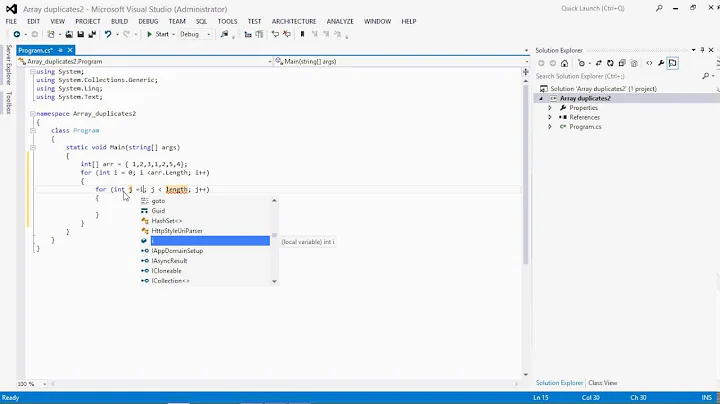C# Determine Duplicate in List
Solution 1
Unless I'm missing something, then you should be able to get away with something simple using Distinct(). Granted it won't be the most complex implementation you could come up with, but it will tell you if any duplicates get removed:
var list = new List<string>();
// Fill the list
if(list.Count != list.Distinct().Count())
{
// Duplicates exist
}
Solution 2
According to Eric White's article on how to Find Duplicates using LINQ:
An easy way to find duplicates is to write a query that groups by the identifier, and then filter for groups that have more than one member. In the following example, we want to know that 4 and 3 are duplicates:
int[] listOfItems = new[] { 4, 2, 3, 1, 6, 4, 3 }; var duplicates = listOfItems .GroupBy(i => i) .Where(g => g.Count() > 1) .Select(g => g.Key); foreach (var d in duplicates) Console.WriteLine(d); // 4,3
Solution 3
In order to allow short circuiting if the duplicate exists early in the list, you can add a HashSet<T> and check the return value of its .Add method.
By using .Any you can short circuit the enumeration as soon as you find a duplicate.
Here's a LINQ extension method in both C# and VB:
CSharp:
public static bool ContainsDuplicates<T>(this IEnumerable<T> enumerable)
{
var knownKeys = new HashSet<T>();
return enumerable.Any(item => !knownKeys.Add(item));
}
Visual Basic:
<Extension>
Public Function ContainsDuplicates(Of T)(ByVal enumerable As IEnumerable(Of T)) As Boolean
Dim knownKeys As New HashSet(Of T)
Return enumerable.Any(Function(item) Not knownKeys.Add(item))
End Function
Note: to check if there are no duplicates, just change Any to All
Solution 4
Place all items in a set and if the count of the set is different from the count of the list then there is a duplicate.
bool hasDuplicates<T>(List<T> myList) {
var hs = new HashSet<T>();
for (var i = 0; i < myList.Count; ++i) {
if (!hs.Add(myList[i])) return true;
}
return false;
}
Should be more efficient than Distinct as there is no need to go through all the list.
Solution 5
You can use IEnumerable.GroupBy method.
var list = new List<string> {"1", "2","3", "1", "2"};
var hasDuplicates = list.GroupBy(x => x).Any(x => x.Skip(1).Any());
Related videos on Youtube
kakridge
Updated on June 19, 2021Comments
-
kakridge almost 3 years
Requirement: In an unsorted List, determine if a duplicate exists. The typical way I would do this is an n-squared nested loop. I'm wondering how others solve this. Is there an elegant, high performance method in Linq? Something generic that takes a lambda or a comparer would be nice.
-
 Peter Perháč about 13 yearsi remember seeing this question on here before and people suggested some neat trick I can't remember what it was though... wait for it... jon skeet is around
Peter Perháč about 13 yearsi remember seeing this question on here before and people suggested some neat trick I can't remember what it was though... wait for it... jon skeet is around -
Trinidad about 13 yearsYour question seems to be answered, you should mark it accordingly, if not satisfied you can edit your question to explain it more clearly. ;)
-
-
BrokenGlass about 13 years+ 1 if I recall correctly
Distinct()uses a Hashtable internally, so should be O(n) -
 Peter Perháč about 13 yearsi wonder how fast distinct is... whether it's not doing the "n-square nested loop" as Kenny mentioned he'd like to avoid.
Peter Perháč about 13 yearsi wonder how fast distinct is... whether it's not doing the "n-square nested loop" as Kenny mentioned he'd like to avoid. -
Justin Niessner about 13 yearsThis will definitely work but will take longer than necessary (the OP only needs to know if duplicates exist or not...not what the duplicate values are).
-
Trinidad about 13 yearsHashSet seems more straight forward to use.
-
 helloV about 13 yearsDon't call list.Count() method. Use the Count property instead. I know LINQ is optimized and it'll use it internally but still I think it's better to use the property.
helloV about 13 yearsDon't call list.Count() method. Use the Count property instead. I know LINQ is optimized and it'll use it internally but still I think it's better to use the property. -
 helloV about 13 yearsDon't call list.Count() method. Use the Count property instead. I know LINQ is optimized and it'll use it internally but still I think it's better to use the property.
helloV about 13 yearsDon't call list.Count() method. Use the Count property instead. I know LINQ is optimized and it'll use it internally but still I think it's better to use the property. -
Ian P about 13 yearsYeah that does make more sense.
-
B Bulfin about 13 years@Trinidad: but will not give you a count
-
Jim Mischel about 13 yearsGranted that it will be more efficient if there are duplicates. But if there are no duplicates, then it does the same amount of work. Which one to use probably depends on whether the "normal" case is that there are aren't duplicates.
-
Trinidad about 13 years@recursive, that's not part of the problem. See: In an unsorted List, determine if a duplicate exists
-
Jim Mischel about 13 years@Petar Petrov: Good point. Probably should just use
foreach. And make the parameterIEnumerable<T>rather thanList<T>. -
Justin Niessner about 13 years@Petar - You're right. I just got a little parenthesis happy when I was writing the original post. Fixed.
-
kakridge about 13 yearsThis was actually my first thought. Thanks to BrokenGlass for confirming that Distinct() is O(n).
-
liang almost 11 yearsThis is more helpful if you need to know the duplicate values are.
-
 CrnaStena almost 10 yearsThis is ok, if you don't care about case-sensitivity.
CrnaStena almost 10 yearsThis is ok, if you don't care about case-sensitivity.new List<string>{"Don","don"};will not report duplicates. You will need to preprocess data before doing counts. -
Drew Noakes over 8 yearsThis is nice an elegant, and is similar to the approach described here that returns duplicates as well.
-
 Vincent Saelzler over 7 years@PetarPetrov - with regards to
Vincent Saelzler over 7 years@PetarPetrov - with regards to.Countversus.Count()I need to use.Count(). If I do not, then I get an error that states Operator '!=' cannot be applied to operands of type 'method group' and 'method group' -
 Vincent Saelzler over 7 yearsEdit to my above comment: My variable was an IEnumerable as opposed to a list. Never mind @PetarPetrov in the case asked by the poster you were totally right!
Vincent Saelzler over 7 yearsEdit to my above comment: My variable was an IEnumerable as opposed to a list. Never mind @PetarPetrov in the case asked by the poster you were totally right! -
 Jean-Charbel VANNIER over 6 yearsThis solution doesn't seems fast as you access the List 3 times. I would consider adding elements to an HasSet until it return false.
Jean-Charbel VANNIER over 6 yearsThis solution doesn't seems fast as you access the List 3 times. I would consider adding elements to an HasSet until it return false. -
 Fabiano Tarlao almost 6 yearsIMHO, I think your answer does not reply to the question. I have understood that the question is about, given an already existing list..finding out a duplicate. You are suggesting a way to manually populate a list, by online outputting when a duplicate is inserted. Also you named uniquelist the list BUT you permit the duplicate insertion that I suppose was not your intention (small bug). Am I right?
Fabiano Tarlao almost 6 yearsIMHO, I think your answer does not reply to the question. I have understood that the question is about, given an already existing list..finding out a duplicate. You are suggesting a way to manually populate a list, by online outputting when a duplicate is inserted. Also you named uniquelist the list BUT you permit the duplicate insertion that I suppose was not your intention (small bug). Am I right? -
 Fabiano Tarlao almost 6 yearsEdit: finding out a duplicate, -> .. finding out IF it contains a duplicate :-)
Fabiano Tarlao almost 6 yearsEdit: finding out a duplicate, -> .. finding out IF it contains a duplicate :-) -
wilfy almost 6 yearsI take your point, however while doing that little exercise (I'm no expert, this is part of a course I am doing), I found this page while looking for a way of determining if the input would be a duplicate within a list. So, the answer stands for other people out there who may not know quite what they are looking for. I couldn't find the answer "if (uniqueNums.Contains(input))" while researching, so perhaps this might help somebody else in their early stages of coding life! :-) That might answer your other question, yes, the input wasn't prevented, that wasn't part of the exercise.
-
 Fabiano Tarlao almost 6 yearsGot your point, but I still think that this is wrong. In the case a question doesn't fit exactly with the answer (you have), it is better to create a new question (for your answer) and simply self-answer to your same question. This is a perfectly legit way to do things. Furthermore, being this question different, it is a bit difficult for people to find out your code snippet that is for a different problem. Perhaps a small blog post makes more sense in your case. But this is only my opinion. Final remark: sometimes by writing answers that do not fit the question you risk downvotes. Regards
Fabiano Tarlao almost 6 yearsGot your point, but I still think that this is wrong. In the case a question doesn't fit exactly with the answer (you have), it is better to create a new question (for your answer) and simply self-answer to your same question. This is a perfectly legit way to do things. Furthermore, being this question different, it is a bit difficult for people to find out your code snippet that is for a different problem. Perhaps a small blog post makes more sense in your case. But this is only my opinion. Final remark: sometimes by writing answers that do not fit the question you risk downvotes. Regards -
 Luca Salzani over 5 yearsFirst Google hit for my problem. Definitly a great piece of info to have here
Luca Salzani over 5 yearsFirst Google hit for my problem. Definitly a great piece of info to have here -
Michael M almost 4 yearsThis is perfect, as I am new to C#, and needed something to track the count for each instance within a set of values (e.g. 20,000+ filenames pulled from an http resource), and I want to know whether any duplicates exist before potentially overwriting files with duplicate filenames. A Dictionary is what I was considering, so it is heartening to see it recommended here.
-
nawfal almost 2 yearsFor efficient count comparisons, you could make use of
MoreLINQ. It got bunch of cool extensions likeAtLeast,AtMost,Exactlyetc. In this case its better to call:if (list.Distinct().Exactly(list.Count))







